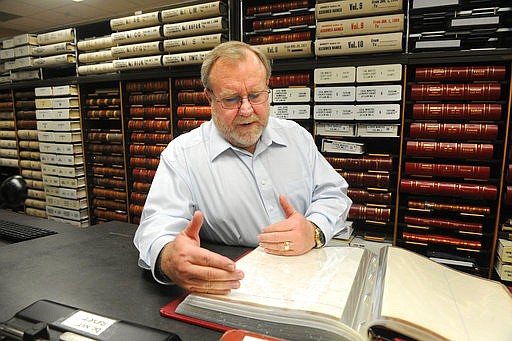ABILENE, Texas -In his office on a recent Wednesday morning, Taylor County Clerk Larry Bevill looked at a plat for a town that does not exist.
"They planned it out, but it never happened," Bevill said, showing the bound plan for what could have been a place called Halltown.
The Abilene Reporter-News reports the initial map of the lost community is just one of manifold historical documents carefully preserved by the clerk's office, with plans for more along the way.
Taylor County commissioners in February approved an expenditure of $83,754.30 to preserve 52 miscellaneous documents dating from 1878 to the 1960s.
As with previous records, pages are to be meticulously cut out of the original, often-crumbling, at times even molding, bound volumes and placed in a new bound format that should preserve them for a couple hundred more years at least, more in some cases.
Manifold treasures are available for those willing to look.
There's a framed document signed by Gov. Richard B. Hubbard in August 1878, proclaiming Buffalo Gap to be the temporary seat of the new county of Taylor.
There's what is likely the first plat of Abilene itself, dated March 9, 1881, mere days before the first auctioning of lots for the young community.
And then there are piles and piles of records. Huge, bound books of them-many of which need preservation for future generations, many already protected.
One, for example, contains the record of the first case tried in county court in Taylor County, in September 1878 in Buffalo Gap-a petition for a continuance.
Other books contain livestock marks and brands, some again dating to the 1800s, with familiar names such as Swenson and Wooten among them.
And as for Halltown, platted out in September 1910, it's still kind of a mystery, Bevill said.
"It could have become another town," he said. "Lawn didn't start out as Lawn, it was Jim Ned. Tye was Tebo, but I've never found anyone who can reference Halltown."
Preserving paper records is vital, Bevill said, and the county clerk's office is taking an active approach to save its oldest examples.
"We've been going at it for several years," he said, the first records sent through the process chosen because of great historical value or frequent daily use.
"We also had those records digitized so people can look the information up on the computer as opposed to turning the page," Bevill said, saliva (from licking fingers) and oil from skin taking their toll on the originals.
"We did about 150 books of Commissioners' Court minutes and some index books in the real property area, and then some other historic volumes," he said.
A favorite of Bevill's is a book of physicians' records.
"Back in the day, in the 1800s and early 1900s, if you were going to practice medicine in a county, you had to put your licenses on file with the county clerk's office," he said.
With no typewriters, that meant dipping a quill in an inkwell and transcribing the document by hand.
But unless you've brushed up on your Latin-or your Spanish or French-good luck reading the entries, which bear no sign of the modern doctor's scrawl, beautifully formed letters accenting almost each page.
"Nowadays, you can't record something in the clerk's office if it's not in English, but back then you could," he said. Bevill actually had some translations made, carefully tucked inside the records' new binder.
The next phase saw preservation of records that had some permanent value, such as probate minutes.
"There was a law that was passed-it was somewhere around six to eight years ago-that said whatever material you have records in (for) 1950 and prior, you have to preserve those records," he said. "So our property, our probate records, we had paper from 1950 back to inception. And so I sent those off, and we also did birth and death records."
Today the probate and birth and death records, placed in their own separate room, are practically armored, covered with an aluminum shell and protected by rubber seals and interior padding.
Not quite disaster-proof, they are disaster-resistant, Bevill said-and primed to preserve the records within for around 300 years.
Probate records are interesting, he said, because they carry both family histories and ownership of real property. Although mostly sealed, birth and death records also carry historical value.
Many of the records approved in February for preservation appear to have-at first blush-little value and are not high-circulation items.
But just because the contents are obscure doesn't mean that the volumes shouldn't be preserved, he said.
"We might not think that they have much value in 2017, but who knows in 2117 what the value will be on these books," he said.
In the meantime, there are plans afoot to preserve even more of the county's history, though it will take considerable funds-about a million dollars, Bevill said-to do. The next phase will be preserving deed records from 1950 back to the beginning.
None of the preservation projects under Bevill's watch have made use of property taxes, he said. The county clerk's office sees about 28,000 documents filed in a year and gets around $10 a document.
"So I'm going to have to save a bit longer, Bevill said. "The people that are bringing in the documents are the people who are paying through user fees. That's a lot better than property taxes."
Bevill said that during his time as clerk, he's seen some major innovations, including providing deputy clerks in misdemeanor courts to help speed up processes and accepting property records and civil and probate court records online.
"We don't touch paper anymore on those," he said.
But the work in preserving the variety of historical records he's had a hand in is even more special than that, he said.
"This is what I'm going to consider my legacy," he said.


